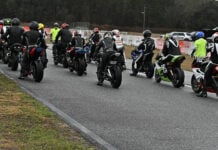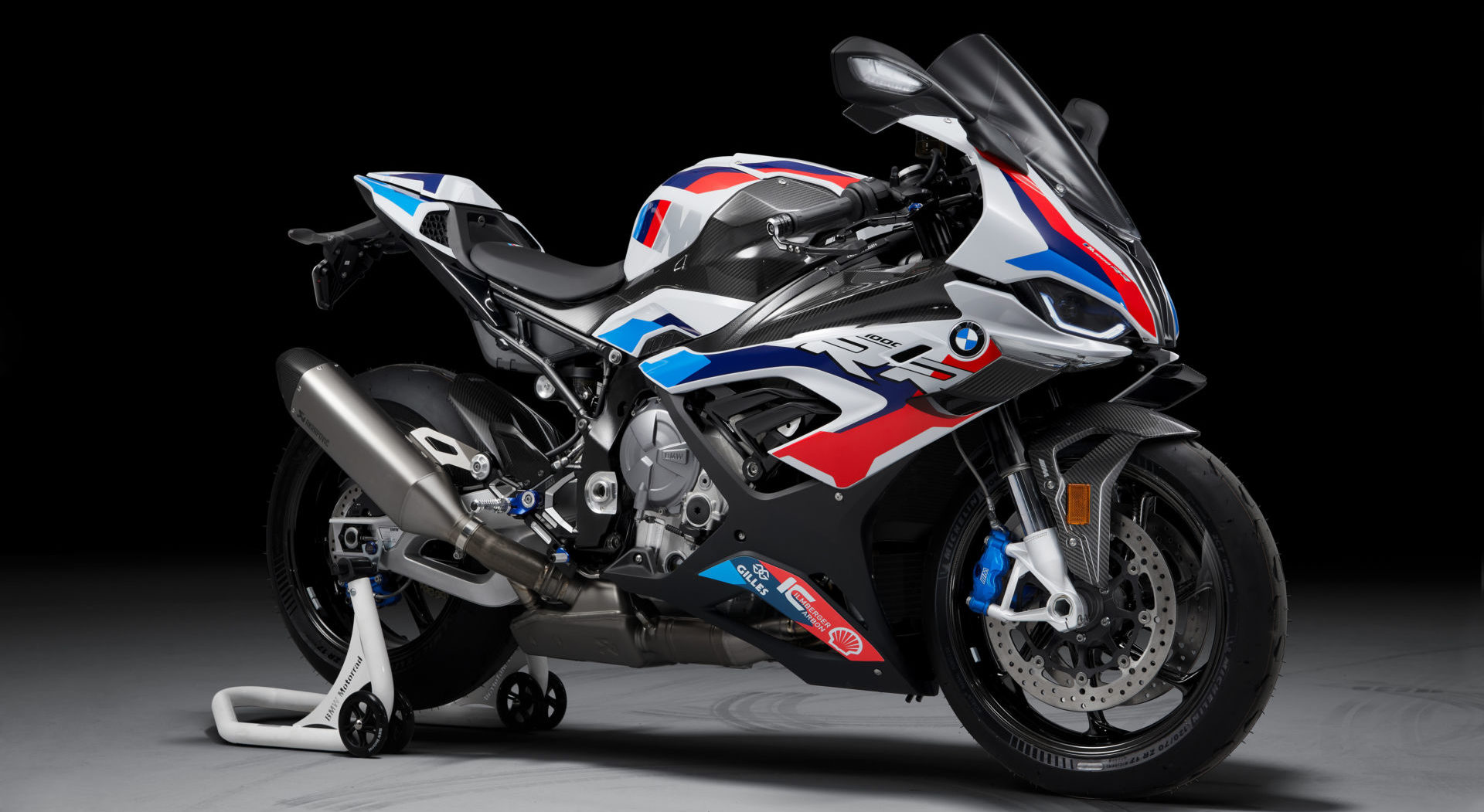The new BMW M RR: Pure racing technology for the highest performance requirements in motor sports and on the road.
BMW Motorrad already introduced the successful M vehicle offer strategy at the end of 2018 for motorcycles and has been offering M optional equipment and M performance parts ever since. With the new BMW M 1000 RR – in the following referred to as M RR in short – the first M model from BMW Motorrad based on the S 1000 RR (RR for short) is now celebrating its world premiere. BMW Motorrad follows the philosophy of the strongest letter in the world: M stands worldwide for success in motor racing and the fascination of high-performance BMW models and is aimed at customers with particularly high demands relating to performance, exclusiveness and individuality.
With an engine output of 156 kW (212 HP), a DIN vehicle kerb weight of only 192 kg and a suspension and aerodynamics designed for maximum race track performance, the new M RR meets the main expectations in the top segment of Superbikes.
M RR four-cylinder engine based on the RR engine for racing sport. More peak power and increased maximum engine speed.
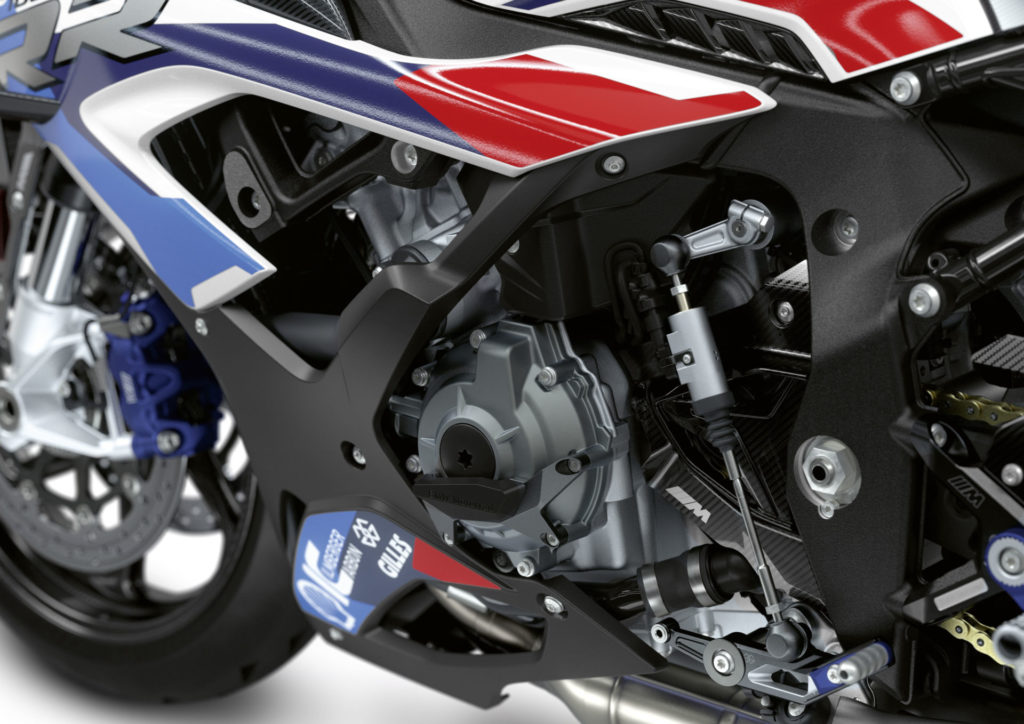
The new M RR uses a water-cooled four-cylinder in-line engine based on the RR power train with BMW ShiftCam technology for varying valve timing and valve lift that has been modified comprehensively in the direction of a racing sport engine. It achieves its peak output of 156 kW (212 HP) at 14,500 rpm. The maximum torque of 113 Nm is applied at 11,000 rpm. In addition to a maximum speed increased to 15,100 rpm, the M RR engine has extensive technical optimisations such as new 2-ring forged pistons from Mahle, adapted combustion chambers, compression increased to 13.5, longer and lighter titanium connecting rods from Pankl, slimmer and lighter rocker arms, fully machined intake ports with new duct geometry as well as optimisations on camshafts and intake area. The lightweight exhaust system is also made of titanium. The new M RR engine is even more powerful than the RR power train in the range from 6,000 rpm to 15,100 rpm, a range that is particularly relevant for race track driving dynamics, but without losing its qualities as a fascinating source of power for sporty driving on country roads.
M winglets and high windscreen: Braking later and accelerating earlier thanks to the aerodynamic downforce without any reduction in maximum speed.
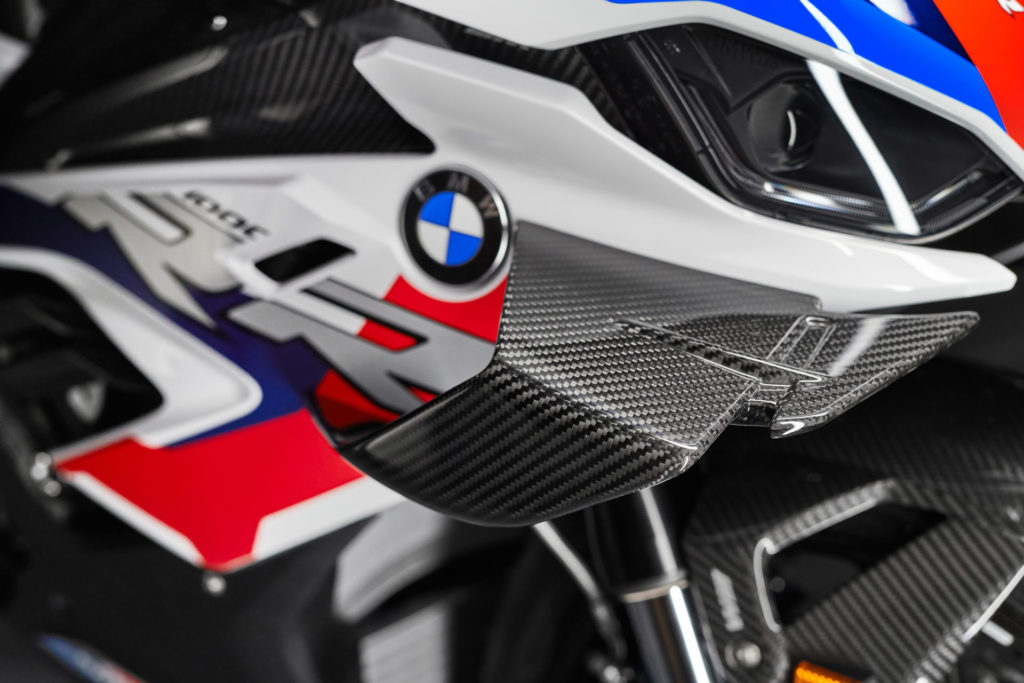
The aerodynamics were a decisive point in the technical specifications for development work of the M RR. In addition to a maximum speed that is as high as possible and absolutely necessary for winning races, there was another objective in the technical specifications of the M RR: to establish the best possible contact of the wheels with the road – especially when accelerating. The M winglets on the trim front, which were developed during intensive testing on the race track and in the BMW Group’s wind tunnel and are made of clear-coat carbon, take this into account as they produce aerodynamic downforce and thus additional wheel loads according to the speed. The additional wheel load on the front wheel counteracts wheelie inclination, traction control regulates less, more driving power is converted into acceleration and the driver achieves faster lap times. The effect of the winglets is also noticeable in curves and when braking, the downforce allows later braking and ensures increased cornering stability.
Chassis design trimmed for race track use with modified geometry, optimised wheel load distribution and extended adjustability of the swinging arm pivot point.
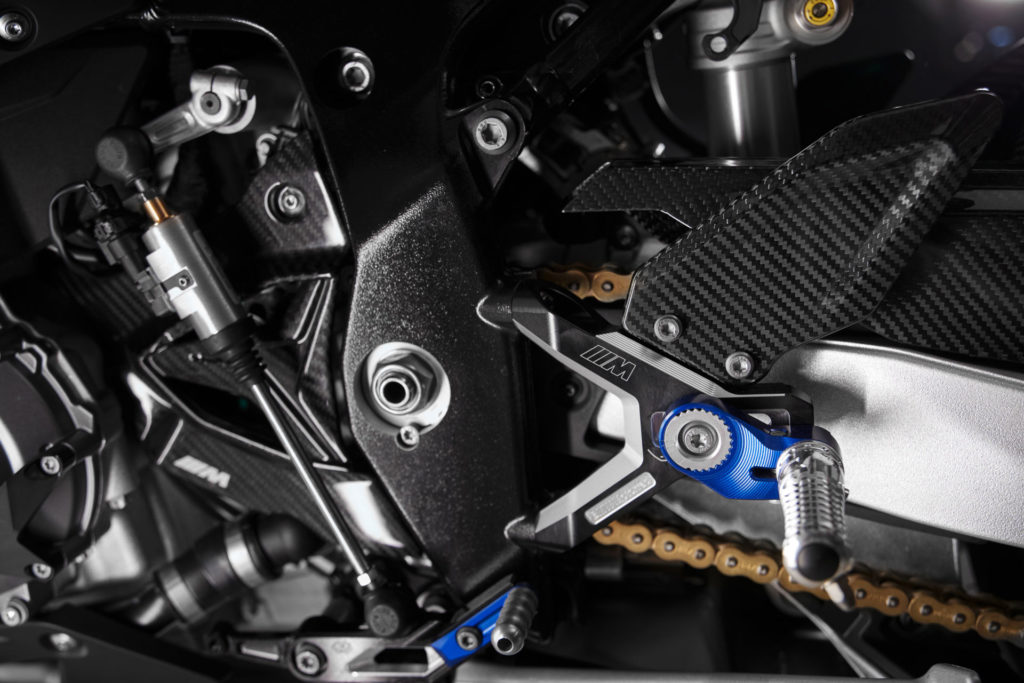
The chassis of the new M RR is based on the RR with the bridge frame made of aluminium at its centrepiece. It has an optimised upside-down fork as well as a revised central spring strut with blue spring and Full Floater Pro kinematics. The primary objective of the chassis design was to achieve the best possible lap times on the race track. The chassis of the M RR is therefore uncompromisingly designed for the race track, but also convinces with qualities for country roads. Special attention was paid to optimising drivability, the braking and anti-squat control as well as the best possible feeling of the driver for the front and rear wheel.
M brakes for the first time at BMW Motorrad as well as M carbon wheels as standard.
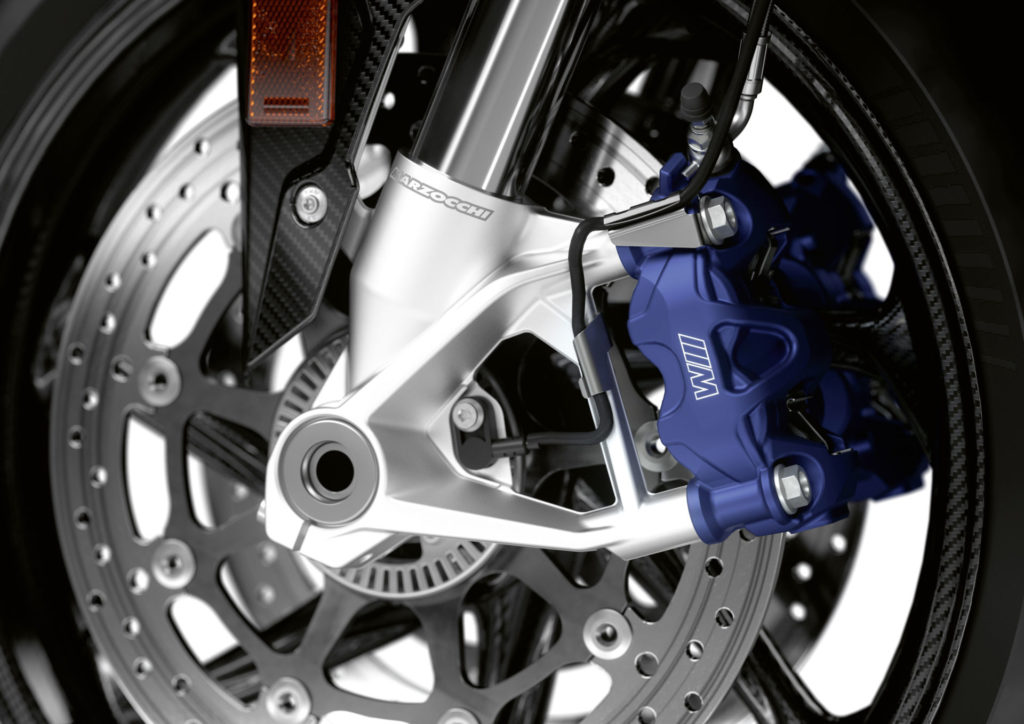
With the new M RR, there is a BMW motorcycle with an M brake for the first time – like the M vehicles of BMW M GmbH. It was developed directly from the experience with the racing brakes of BMW Motorrad company racing machines in the Superbike World Championship and provides maximum fading stability and controllability. Externally, the M brake callipers have a blue anodised coating in combination with the M logo. With the M carbon wheels, the new M RR has more high-tech components for maximum performance on the race track and road.
Instrument cluster with perfectly readable 6.5-inch TFT display and OBD interface that can be used with activation code for the M GPS data logger and M GPS laptrigger.
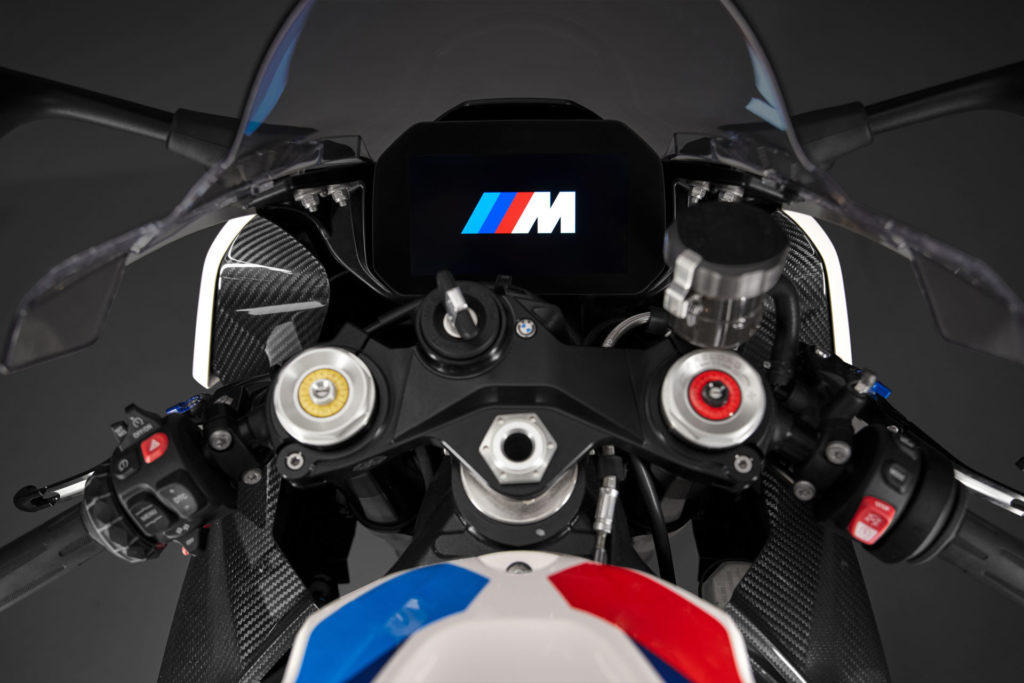
The instrument cluster of the new M RR has the same basic design as the RR and has an M start animation. As part of the optional equipment, an activation code (contents of M competition package) can be used to provide comprehensive data material for the use of the M GPS laptrigger and M GPS data logger (Original BMW Motorrad Accessories) via the OBD interface of the instrument cluster.
Born for racing: M design and dynamic form language of the M RR indicate ultimate race track performance.
The new M RR emphasises its racing genes with the light white solid paint/M Sport colour scheme in the basic colours light blue, dark blue and red. Further features of the M RR are the engine covers in granite grey and the fuel filler cap painted black.
Uncompromising in design and technology: The M RR with M competition package.
For those who are still not satisfied with the new M RR in standard trim, the M competition package provides a fascinating mixture of classy components for the racing technology gourmet and the aesthete at the same time. In addition to the M GPS laptrigger software and the corresponding activation code, the M competition package also includes the M milled parts package, the M carbon package as well as a silver 220 g lighter swinging arm, the friction-optimised, maintenance-free and DLC-coated M Endurance chain and the passenger package including tail-hump cover.
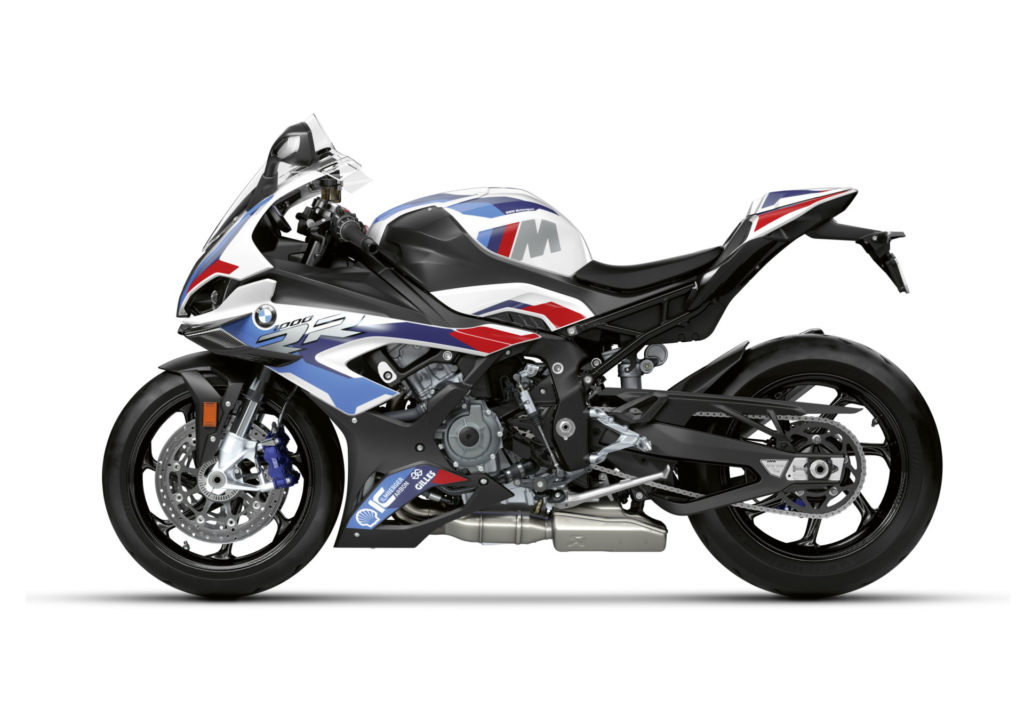
The highlights of the new BMW M 1000 RR.
• M RR four-cylinder engine based on the RR engine for racing sport. Even more peak power, higher torque in the medium range and 500 rpm more maximum speed.
• 156 kW output at 14 500 rpm and thus 4 kW more than in the RR. Maximum torque of 113 Nm at 11 000 rpm.
• New 2-ring forged piston 12 g lighter, adapted combustion chamber and compression increased to 13.5. In addition, slimmer and lighter rocker arms.
• Fully machined intake ports with new duct geometry and BMW ShiftCam technology for varying the valve control time and valve lift.
• Titanium valves, on the exhaust side with new spring assembly, slimmer and 6 % lighter rocker arms and optimised camshafts.
• Very light, compact engine block with longer and 85 g lighter titanium connecting rods from Pankl for reduced friction power and less weight.
• Anti-hopping clutch without self-reinforcing for optimum Launch Control.
• Optimised differentiated intake system with shorter intake funnels for optimised gas exchange at high rotational speeds.
• New, 3,657 g lighter exhaust system with exhaust manifold, front silencer and rear silencer made of titanium.
• M winglets and high windscreen: Braking later and accelerating earlier and more stability when cornering thanks to the aerodynamic downforce without any reduction in maximum speed.
• “Rain”, “Road”, “Dynamic”, “Race”“ and “Race Pro1-3” riding modes and the latest generation of the Dynamic Traction Control (DTC) and DTC wheelie function with 6-axle sensor box.
• Two adjustable characteristic throttle curves for optimum response characteristics. Engine brake with threefold adjustable engine drag torque in “Race Pro” mode.
• Shift assistant Pro for shifting gears up and down without clutch. Simple reversibility of the shift pattern for race track use.
• Launch Control for perfect race starts and Pit-Lane-Limiter for precise speed in the pit lane.
• Hill Start Control Pro for convenient starting on slopes.
• Chassis design trimmed for race track use with modified geometry, optimised wheel load distribution and extended adjustability of the swinging arm pivot point.
• Optimised upside-down fork and revised central spring strut with Full Floater Pro kinematics.
• M brakes for the first time at BMW Motorrad: The M RR with maximum braking performance for the race track.
• M carbon wheels: Classy high-tech components for maximum performance on race track and road.
• Instrument cluster with large, perfectly readable 6.5-inch TFT display, starting animation with M logo and OBD interface that can be used with activation code for the M GPS data logger and M GPS laptrigger.
• Lightweight M battery, USB charging socket in the rear, powerful integrated LED light units and heated grips.
• M design and dynamic form language indicate ultimate race track performance.
• M competition package with M GPS laptrigger and activation code, M milled parts package, M carbon package, silver, 220 g lighter swinging arm, DLC-coated M endurance chain and passenger package including tail-hump cover.
• Comprehensive optional accessories and optional equipment ex works.




